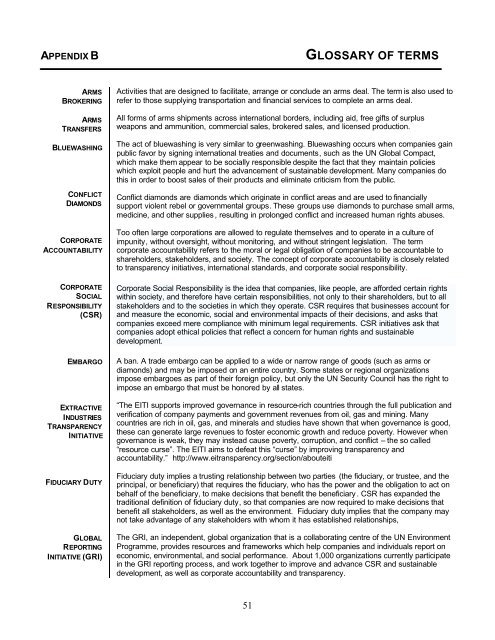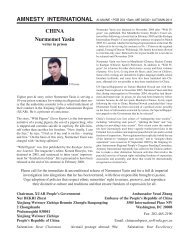Blood Diamond Curriculum Guide (PDF) - Amnesty International USA
Blood Diamond Curriculum Guide (PDF) - Amnesty International USA
Blood Diamond Curriculum Guide (PDF) - Amnesty International USA
You also want an ePaper? Increase the reach of your titles
YUMPU automatically turns print PDFs into web optimized ePapers that Google loves.
APPENDIX B GLOSSARY OF TERMS<br />
ARMS<br />
BROKERING<br />
ARMS<br />
TRANSFERS<br />
BLUEWASHING<br />
CONFLICT<br />
DIAMONDS<br />
CORPORATE<br />
ACCOUNTABILITY<br />
CORPORATE<br />
SOCIAL<br />
RESPONSIBILITY<br />
(CSR)<br />
EMBARGO<br />
EXTRACTIVE<br />
INDUSTRIES<br />
TRANSPARENCY<br />
INITIATIVE<br />
FIDUCIARY DUTY<br />
GLOBAL<br />
REPORTING<br />
INITIATIVE (GRI)<br />
Activities that are designed to facilitate, arrange or conclude an arms deal. The term is also used to<br />
refer to those supplying transportation and financial services to complete an arms deal.<br />
All forms of arms shipments across international borders, including aid, free gifts of surplus<br />
weapons and ammunition, commercial sales, brokered sales, and licensed production.<br />
The act of bluewashing is very similar to greenwashing. Bluewashing occurs when companies gain<br />
public favor by signing international treaties and documents, such as the UN Global Compact,<br />
which make them appear to be socially responsible despite the fact that they maintain policies<br />
which exploit people and hurt the advancement of sustainable development. Many companies do<br />
this in order to boost sales of their products and eliminate criticism from the public.<br />
Conflict diamonds are diamonds which originate in conflict areas and are used to financially<br />
support violent rebel or governmental groups. These groups use diamonds to purchase small arms,<br />
medicine, and other supplies , resulting in prolonged conflict and increased human rights abuses.<br />
Too often large corporations are allowed to regulate themselves and to operate in a culture of<br />
impunity, without oversight, without monitoring, and without stringent legislation. The term<br />
corporate accountability refers to the moral or legal obligation of companies to be accountable to<br />
shareholders, stakeholders, and society. The concept of corporate accountability is closely related<br />
to transparency initiatives, international standards, and corporate social responsibility.<br />
Corporate Social Responsibility is the idea that companies, like people, are afforded certain rights<br />
within society, and therefore have certain responsibilities, not only to their shareholders, but to all<br />
stakeholders and to the societies in which they operate. CSR requires that businesses account for<br />
and measure the economic, social and environmental impacts of their decisions, and asks that<br />
companies exceed mere compliance with minimum legal requirements. CSR initiatives ask that<br />
companies adopt ethical policies that reflect a concern for human rights and sustainable<br />
development.<br />
A ban. A trade embargo can be applied to a wide or narrow range of goods (such as arms or<br />
diamonds) and may be imposed on an entire country. Some states or regional organizations<br />
impose embargoes as part of their foreign policy, but only the UN Security Council has the right to<br />
impose an embargo that must be honored by all states.<br />
“The EITI supports improved governance in resource-rich countries through the full publication and<br />
verification of company payments and government revenues from oil, gas and mining. Many<br />
countries are rich in oil, gas, and minerals and studies have shown that when governance is good,<br />
these can generate large revenues to foster economic growth and reduce poverty. However when<br />
governance is weak, they may instead cause poverty, corruption, and conflict – the so called<br />
“resource curse”. The EITI aims to defeat this “curse” by improving transparency and<br />
accountability.” http://www.eitransparency.org/section/abouteiti<br />
Fiduciary duty implies a trusting relationship between two parties (the fiduciary, or trustee, and the<br />
principal, or beneficiary) that requires the fiduciary, who has the power and the obligation to act on<br />
behalf of the beneficiary, to make decisions that benefit the beneficiary . CSR has expanded the<br />
traditional definition of fiduciary duty, so that companies are now required to make decisions that<br />
benefit all stakeholders, as well as the environment. Fiduciary duty implies that the company may<br />
not take advantage of any stakeholders with whom it has established relationships,<br />
The GRI, an independent, global organization that is a collaborating centre of the UN Environment<br />
Programme, provides resources and frameworks which help companies and individuals report on<br />
economic, environmental, and social performance. About 1,000 organizations currently participate<br />
in the GRI reporting process, and work together to improve and advance CSR and sustainable<br />
development, as well as corporate accountability and transparency.<br />
51






